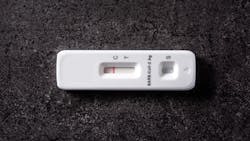At-home COVID-19 antigen tests-take steps to reduce your risk of false negative
The U.S. Food and Drug Administration (FDA) is advising people to perform repeat, or serial, testing following a negative result on any at-home COVID-19 antigen test, to reduce the risk an infection may be missed (false negative result) and to help prevent people from unknowingly spreading the SARS-CoV-2 virus to others. The FDA recommends repeat testing following a negative result whether or not you have COVID-19 symptoms.
At-home COVID-19 antigen tests detect proteins, called antigens, from the SARS-CoV-2, the virus that causes COVID-19. At-home COVID-19 antigen tests are less likely to detect the SARS-CoV-2 virus than molecular tests, such as polymerase chain reaction (PCR) tests. This is especially true early in an infection or in people who do not have COVID-19 symptoms. Currently, all at-home COVID-19 antigen tests are FDA-authorized for repeat, or serial use. This means people should use multiple tests over a certain time period, such as 2-3 days, especially when the people using the tests don't have COVID-19 symptoms. Today, the FDA is highlighting the continued need for repeat, or serial testing when people get a negative result with an at-home COVID-19 antigen test, including recommending additional testing over a longer period of time.
Over the course of the COVID-19 pandemic, public health scientists have continued to learn about the SARS-CoV-2 virus and the impact of variants on diagnostic tests that detect SARS-CoV-2. Today's recommendations are based on the latest study results from people with likely omicron infection showing that repeat testing after a negative at-home COVID-19 antigen test result increases the chance of an accurate result. COVID-19 diagnostic testing remains a cornerstone of our nation's fight against COVID-19. At-home COVID-19 antigen tests, while not perfect, provide a fast and convenient COVID-19 testing option.

